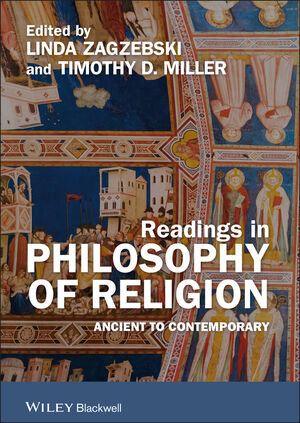|
Textbook
Readings in Philosophy of Religion: Ancient to ContemporaryISBN: 978-1-4051-8091-7
Paperback
670 pages
March 2009, ©2009, Wiley-Blackwell
 This is a Print-on-Demand title. It will be printed specifically to fill your order. Please allow an additional 10-15 days delivery time. The book is not returnable.
|
||||||
General Introduction.
I The Philosophical Treatment of Religion.
Introduction.
1 The Nature of the Gods, Book 1 (Cicero).
II Classical Arguments for Theism.
Introduction.
A Teleological Arguments .
1 The Design Argument (Cicero).
2 The Fifth Way (Thomas Aquinas).
3 The Watch and the Watchmaker (William Paley).
4 Critique of the Design Argument (David Hume).
5 The Teleological Argument (Robin Collins).
6 The Argument from the Appearance of Design (J. J. C. Smart).
B Cosmological Arguments.
1 Plato’s Cosmological Argument (Plato).
2 The Eternality of Motion and the Unmoved Mover (Aristotle).
3 The Kalām Cosmological Argument (Al-Ghazali).
4 The Existence and Oneness of God (Moses Maimonides).
5 The First Three Ways (Thomas Aquinas).
6 The Argument from Dependent Beings (Samuel Clarke).
7 Critique of the Cosmological Argument (David Hume).
C Ontological Arguments.
1 Anselm’s Ontological Argument (Anselm).
2 Descartes’s Ontological Argument (René Descartes).
3 Kant’s Critique of the Three Traditional Proofs (Immanuel Kant).
4 The Ontological Argument (Alvin Plantinga).
III: Other Approaches to Religious Belief.
Introduction.
A Experience and Revelation as Grounds for Religious Belief.
1 The Numinous (Rudolf Otto).
2 Mysticism and Religious Experience (William J Wainwright).
3 The Existence of God and the Existence of Homer: Rethinking Theism and Revelatory Claims (Sandra Menssen and Thomas D. Sullivan).
B Fideism.
1 Truth is Subjectivity (Søren Kierkegaard).
2 Kierkegaard’s Arguments against Objective Reasoning in Religion (Robert M Adams).
3 Lectures on Religious Belief (Ludwig Wittgenstein).
C Naturalistic Re-interpretations of Religious Belief.
1 Origin of Religion (David Hume).
2 The Essence of Religion in General (Ludwig Feuerbach).
3 The Future of an Illusion (Sigmund Freud).
IV: Who or What is God?.
Introduction.
1 On Being (Melissus of Samos).
2 The Final Cause (Aristotle).
3 The Divine Darkness (Pseudo-Dionysius the Areopagite).
4 Perfect Being (Anselm).
5 On the Trinity (Richard of St Victor).
6 Omnipotence (Peter Geach).
7 Omniscience and Immutability (Norman Kretzmann).
8 Atemporal Personhood (William L Craig).
V: Fate, Freedom, and Foreknowledge.
Introduction.
1 The Sea Battle Argument (Aristotle).
2 On Fate and On Divination (Cicero).
3 God’s Timeless Knowing (Boethius).
4 Ockham on God’s Foreknowledge, and Future Contingents (Marilyn Adams).
5 Middle Knowledge (William Hasker).
VI: Religion and Morality.
Introduction.
A Is Religion Needed for Morality?
1 God is the Measure of All Things (Plato).
2 The Moral Argument for the Existence of God (Immanuel Kant).
B Devine Command Theory and Devine Motivation Theory.
1 The Euthyphro Dilemma (Plato).
2 Questions on the Books of the Sentences (Pierre d’Ailly).
3 Lectures on Romans (Martin Luther).
4 Divine Commands (Robert M Adams).
5 The Virtues of God and the Foundations of Ethics (Linda Zagzebski).
C Natural Law.
1 Selections from Treatise on Law (Thomas Aquinas).
VII: The Problem of Evil.
Introduction.
1 God is Not the Author of Evil (Plato).
2 On the Anger of God (Lactantius).
3 That Which Is, Is Good (Augustine).
4 On the Free Choice of the Will (Augustine).
5 Formal Summary of the Theodicy (Gottfried Leibniz).
6 Myth of the Goddess Pallas (Gottfried Leibniz).
7 Evil and Omnipotence (J L Mackie).
8 The Free Will Defense (Alvin Plantinga).
9 Soul-making Theodicy (John Hick).
10 Friendly Atheism, Skeptical Theism, and the Problem of Evil (William L Rowe).
11 Horrendous Evils and the Goodness of God (Marilyn Adams).
VIII: Death and Immortality.
Introduction.
1 Death is Nothing to Us (Epicurus).
2 Death (Thomas Nagel).
B Life after Death.
1 The Separation of the Soul from the Body (Plato).
2 The Future Life (Averroes (Ibn Rushd)).
3 The Possibility of Immortality (René Descartes).
4 Personal Identity and Consciousness (John Locke).
5 Do We Survive Death (Bertrand Russell)?
6 Religious and Near-death Experiences in Relation to Belief in a Future Life (Paul Badham).
IX: The Diversity of Religions.
Introduction.
1 Religious Pluralism and Salvation (John Hick).
2 The Bodhgaya Interview (1981) (The Dalai Lama).
3 Christianity and the Non-Christian Religions (Karl Rahner).
4 Self-trust and the Diversity of Religions (Linda Zagzebski).
X: Faith, Reason, and the Ethics of Belief.
Introduction.
A Faith and Reason.
1 How Justin Found Philosophy (Justin Martyr).
2 Prescriptions against the Heretics (Tertullian).
3 In What Respect Philosophy Contributes to the Comprehension of Divine Truth (Clement of Alexandria).
4 The Decisive Treatise, Determining the Nature of the Connection between Religion and Philosophy (Averroes (Ibn Rushd)).
5 Faith and Reason (Thomas Aquinas).
6 Belief in God is Natural (John Calvin).
7 Faith, Reason, and Enthusiasm (John Locke).
8 Return to Reason: The Irrationality of Evidentialism (Kelly James Clark).
B Pragmatism and the Ethics of Belief.
1 The Wager (Blaise Pascal).
2 Pascalian Wagering (Thomas V Morris).
3 The Ethics of Belief (W K Clifford).
4 The Will to Believe (William James).
XI: Science, Religion, and Naturalism.
Introduction.
A Miracles.
1 Miracles (Thomas Aquinas).
2 A Discourse of Miracles (John Locke).
3 Of Miracles (David Hume).
4 David Hume and the Probability of Miracles (George I Mavrodes).
B Science, Religion, and Naturalism.
1 Letter to Castelli (Galileo Galilei).
2 Signs of Intelligence (William A Dembski).
3 Atheism and Evolution (Daniel C Dennett).
4 Darwin, Design, and Divine Providence (John F Haught).
5 How Naturalism Implies Skepticism (Alvin Plantinga).
6 A House Divided Against Itself Cannot Stand: Plantinga on the Self-defeat of Evolutionary Naturalism (Timothy O’Connor).



